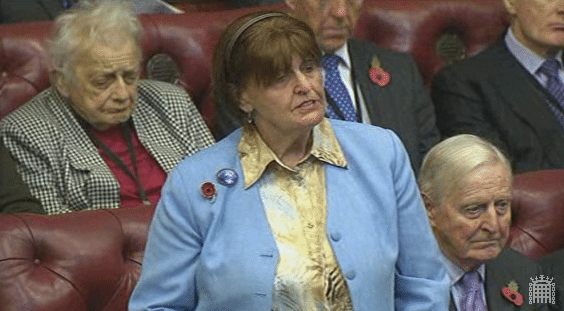Help our local partners realise their vision of hope for their communities

On Thursday October 30th 2014, Baroness Cox raised a question in the House of Lords on the recent developments in Nigeria. The Baroness asked “Her Majesty’s Government what assessment they have made of recent developments in Nigeria, with particular reference to the terrorist activities of Boko Haram.”
The Minister of State, Foreign and Commonwealth Office, Baroness Anelay of St Johns, acknowledged the serious threat posed to Nigeria by Boko Haram, highlighting that “more than 3,000 people have been killed by Boko Haram this year and more than 1.5 million people have been displaced.” Moreover, the Minister reported the government’s awareness of “reports that Nigerian authorities have agreed a ceasefire with Boko Haram and are in ongoing negotiations.” The minister also mentioned the government’s knowledge of “reports of Boko Haram attacks since the ceasefire announcement.” The government, Baroness Anelay concluded, is “[monitoring] events closely.”
Baroness Cox then brought to the Peers’ attention that, having visited areas afflicted by Boko Haram’s insurgency, “the scale of suffering to which [the Minister] refers massively exceeds that reported by the media.” She highlighted that “this year alone 2,000 women and girls have been abducted”, a figure that includes “the widely publicized kidnapping of the schoolgirls at Chibok”.
Baroness Cox also brought to the Minister’s attention the slaughtering of “173 teachers and hundreds of students, including Muslim students” and the “savage attacks on Christian communities [that] continue to the present day.” She then noted the fragility of the ongoing ceasefire between Boko Haram and the Nigerian Federal Government by bringing to the Minister’s attention that “local people do not believe that the federal and state authorities are sufficiently willing or able to stop Boko Haram’s reign of terror.” In light of the overall frailty of the situation, she concluded by asking “will Her Majesty’s Government make the strongest possible representation to the Government of Nigeria to do much more to implement effective policies to protect all its citizens from this escalating terrorism?”
The Minister replied by “[paying] tribute for [Baroness Cox’s] courageous work, not only in Nigeria but around the world.” She also made clear the government’s knowledge of Boko Haram’s targeting of “the weak and vulnerable, causing suffering in communities of differing faiths and ethnicities.” She then concluded with the reassurance that the government is in “continual discussion with the Nigerian authorities to press exactly as the noble Baroness [Cox] says, and we give as much support as we can in intelligence matters.”
Lord Chidgey then intervened by asking, in the light of further abductions of women after the October 17th ceasefire, “What action can the Government take to help galvanise the Nigerian authorities into some action to protect these schoolgirls from organised rape, forced conversion to Islam and mass murder?”
The Minister replied by firstly highlighting that at the centre of the British government’s aid to Nigerian authorities is “the care … for what might happen, not only to the Chibok girls but to others who have been seized.” She continued by stating that, despite the UK’s provision of “surveillance assets and intelligence expertise to help in the search for the Chibok girls”, as well as “Sentinel and Tornado GR4 aircraft with surveillance capabilities”, ultimately “it is for the Nigerian authorities to resolve the matter.”
Baroness Kinnock of Holyhead then raised an important issue by asking what is the UK doing to “ensure that there are medical and mental health services for the victims of abductions?” The Minister replied by bringing the peers’ focus “first on the release, not only of the Chibok girls but of others” and then “see what their needs may be, what support needs to be given to them and theirs families, and which choices the girls may wish to make.” She then concluded by assuring “the noble Baroness that, through [the] DfID programme, [the government] provide[s] aid to the area to try to assist the society to grow and survive.”
Other peers, including Lord West of Spithead, Baroness Berridge and the Lord Bishop of Lichfield joined the discussion by raising issues related to Boko Haram’s funds and violent insurgency.
The full text of the debate can be found here. You can also watch the debate online here.
The report from HART’s July 2014 visit to northern Nigeria is available here.